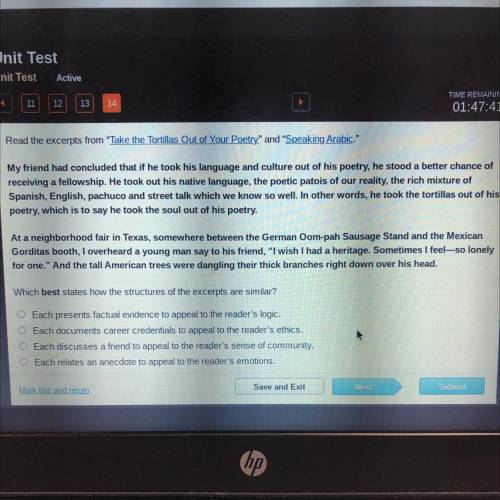
English, 08.06.2021 22:40 boonkgang6821
Read the excerpts from "Take the Tortillas Out of Your Poetry" and "Speaking Arabic."
My friend had concluded that if he took his language and culture out of his poetry, he stood a better chance of receiving a fellowship. He took out his native language, the poetic patois of our reality, the rich mixture of Spanish, English, pachuco and street talk which we know so well. In other words, he took the tortillas out of his
poetry, which is to say he took the soul out of his poetry.
At a neighborhood fair in Texas, somewhere between the German Oom-pah Sausage Stand and the Mexican Gorditas booth, I overheard a young man say to his friend, “I wish I had a heritage. Sometimes I feel-so lonely
for one." And the tall American trees were dangling their thick branches right down over his head.
Which best states how the structures of the excerpts are similar?
A) Each presents factual evidence to appeal to the reader's logic.
B) Each documents career credentials to appeal to the reader's ethics.
C) Each discusses a friend to appeal to the reader's sense of community.
D) Each relates an anecdote to appeal to the reader's emotions.


Answers: 1


Another question on English

English, 21.06.2019 15:00
In the reading, statement on the assassination of martin luther king, jr., which of the following inferences is best supported by the second paragraph? martin luther king dedicated his life to love and to justice between fellow human beings. he died in the cause of that effort. in this difficult day, in this difficult time for the united states, it’s perhaps well to ask what kind of a nation we are and what direction we want to move in. for those of you who are black—considering the evidence evidently is that there were white people who were responsible—you can be filled with bitterness, and with hatred, and a desire for revenge. question 5 options: a) the speaker is urging the same non-violent response that was preached by the slain martin luther king, jr. b) the speaker doesn’t want people to be angry about the death of martin luther king, jr. c) the speaker is trying to encourage racial resentment. d) the speaker wishes he hadn’t been born an american citizen.
Answers: 2


English, 22.06.2019 04:00
Lisa works 7 hours a day, 7 days a week. how many hours does lisa work in 6 weeks
Answers: 2

English, 22.06.2019 04:50
Read the passage, then answer the question that follows. no one could have seen it at the time, but the invention of beet sugar was not just a challenge to cane. it was a hint—just a glimpse, like a twist that comes about two thirds of the way through a movie—that the end of the age of sugar was in sight. for beet sugar showed that in order to create that perfect sweetness you did not need slaves, you did not need plantations, in fact you did not even need cane. beet sugar was a foreshadowing of what we have today: the age of science, in which sweetness is a product of chemistry, not whips. in 1854 only 11 percent of world sugar production came from beets. by 1899 the percentage had risen to about 65 percent. and beet sugar was just the first challenge to cane. by 1879 chemists discovered saccharine—a laboratory-created substance that is several hundred times sweeter than natural sugar. today the sweeteners used in the foods you eat may come from corn (high-fructose corn syrup), from fruit (fructose), or directly from the lab (for example, aspartame, invented in 1965, or sucralose—splenda—created in 1976). brazil is the land that imported more africans than any other to work on sugar plantations, and in brazil the soil is still perfect for sugar. cane grows in brazil today, but not always for sugar. instead, cane is often used to create ethanol, much as corn farmers in america now convert their harvest into fuel. –sugar changed the world, marc aronson and marina budhos how does this passage support the claim that sugar was tied to the struggle for freedom? it shows that the invention of beet sugar created competition for cane sugar. it shows that technology had a role in changing how we sweeten our foods. it shows that the beet sugar trade provided jobs for formerly enslaved workers. it shows that sweeteners did not need to be the product of sugar plantations and slavery.
Answers: 1
You know the right answer?
Read the excerpts from "Take the Tortillas Out of Your Poetry" and "Speaking Arabic."
My friend had...
Questions



History, 19.11.2019 21:31



















